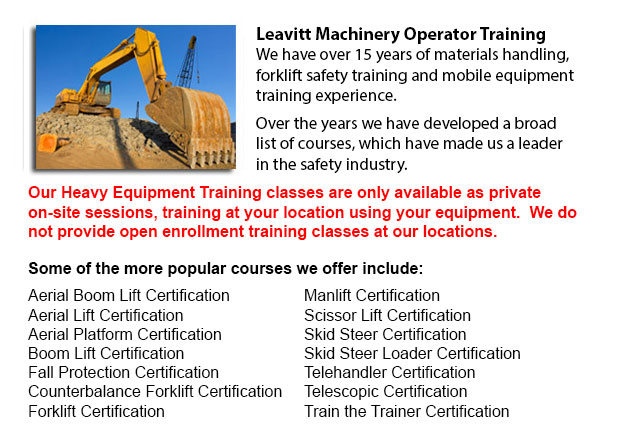
Heavy Equipment Training Courses Windsor - When selecting a heavy equipment operator course, the first step should be to determine the capacity in which you will be working with heavy machinery. You can find the right course to teach you how to operate the machines or to fix these machines. Numerous options are available, be sure to align your career goals and your research so you can determine which classes would be most appropriate for you. It is vital to select classes that are recognized and approved by the local governing bodies in your district.
There are plenty of certification kinds around. Some training is specific to the particular type of heavy machine you want to operate. Like for example, crane operator certification will need different heavy machine classes than those found in forklift certification. Crane certification would allow you to safely operate a crane, whereas the latter would enable you to handle various types of materials handling equipment. It is a great idea to check with your current employer prior to enrolling in whatever classes in order to make sure that the ones you select would fulfill the training requirements your employer has set out for you.
Heavy Equipment Operator Training
The heavy equipment operator courses will assist the operator in attaining the necessary skills and knowledge they would require to enter the workforce as an entry level operator. In this 12 week course plus a practicum, you would focus on jobsite fundamentals including: environmental, safety and health awareness and training, equipment maintenance and operation, and application of earth moving techniques in hands-on conditions.
This training helps you to operate on chosen things of equipment like for instance a loader, compactor, dozer, grader and an excavator. There are various essential skills needed to become a heavy equipment operator: excellent oral communication skills, good problem solving skills, good spatial ability and good vision, physical strength and stamina, the ability to work alone or well with others in a team and excellent manual dexterity along with good eye-hand coordination.
Some technical skills are likewise required. These are having a general mechanical ability, being able to operate equipment and power tools, understanding of safe working procedures, the ability to follow grade plans, technical specifications and read directions, the ability to make mathematical calculations and basic measurements, and the ability to carry out basic maintenance and mechanical repairs.
-
Manlift Safety Training Windsor
Manlift Safety Training Windsor - Manlift operators should be cognizant and aware of all the potential dangers which are connected with particular classes of scissor lifts. They need to be able to operate the scissor lift in a way that protects not o... More -
Loader Training Windsor
Loader Training Windsor - Loader Training - Why It Is Essential - People wanting work in companies which utilize forklifts must undergo a Loader Training program before becoming a certified operator of a lift truck. There are many ways to go about ob... More -
Manlift Training Windsor
Manlift Training Windsor - Different manlift training courses consist of the content and review of manlift devices. An essential part of the course is the practicum where students show their knowledge and practical ability to operate the manlift safe... More -
Overhead Crane Ticket Windsor
Overhead Crane Ticket Windsor - An overhead crane is commonly utilized in industrial settings. Also known as a bridge crane, this particular equipment consists of parallel runways spanned by a traveling bridge. The hoist is the part which lifts mater... More -
Boom Lift License Windsor
Boom Lift License Windsor - To operate an aerial boom lift, operators should be qualified through training which could be obtained using both practical training and classroom sessions and by obtaining a boom lift license. Instruction should be given... More -
Overhead Crane Safety Training Windsor
Overhead Crane Safety Training Windsor - The overhead crane safety training program is designed to equip the operators with the right skills and knowledge in the areas of: crane safety measures, materials handling, accident avoidance, and equipment a... More -
Crane Training Courses Windsor
Crane Training Courses Windsor - The heavy machinery crane is intended to be able to lift, lower and move heavy supplies. Normally, the crane comes outfitted along with a hoist, sheaves, and chains or wire ropes. Cranes are utilized in the businesses... More -
Counterbalance Forklift License Windsor
Counterbalance Forklift License Windsor - When operated by completely trained operators, forklifts can become a major asset for firms and companies. We can offer your staff a comprehensive training program which covers all factors of operating a powe... More

Forklift Training Windsor
TOLL FREE: 1-888-254-6157
Windsor, Ontario
forklifttrainingwindsor.com
Email Us
About Us


